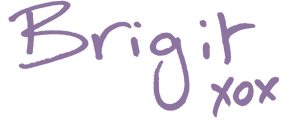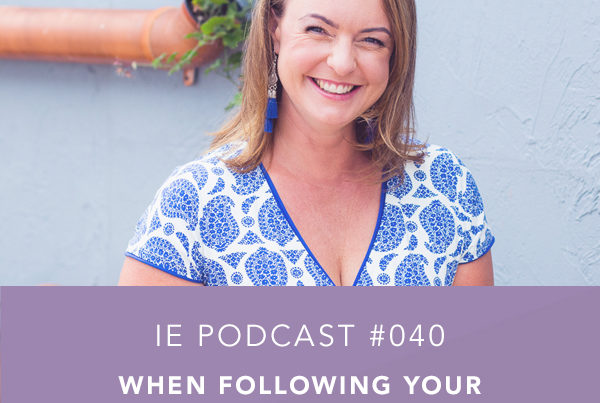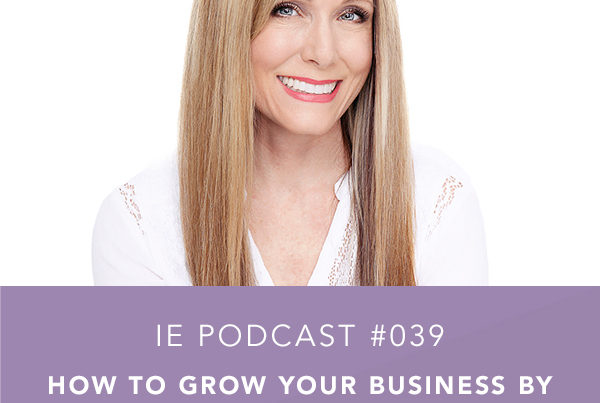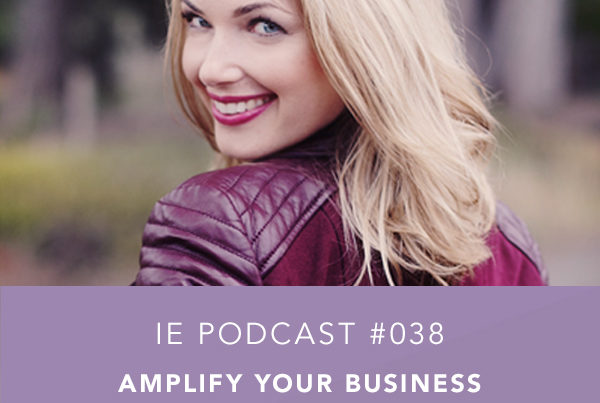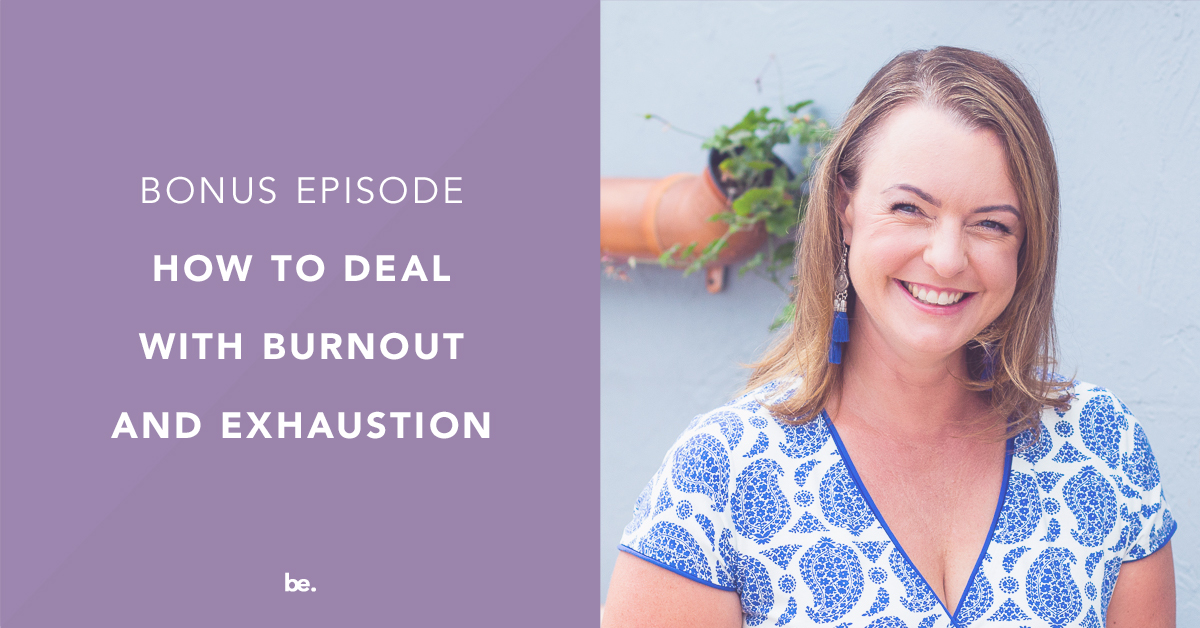
Want to help share the power of intuition + strategy in business? Subscribe and leave a review on iTunes. Here’s how.
We all know someone who has experienced burnout and exhaustion due to the intensity of effort they’re putting into their business. Perhaps that “someone” was you. High performers and highly engaged employees often burnout from work related stress. And entrepreneurs are most at risk, particularly in start-up phase or when creating and launching new offerings. Stress factors like no steady income, no guarantee of success, decision fatigue, and passion turned into profit, all take their toll.
Yes, it may be necessary to dedicate yourself wholly to the business during certain phases, but it’s important to recognise when a “phase” becomes your entire mode of operation. Every day of the year. The relentless heightened adrenaline and stress can lead to serious physical and mental health issues, and ultimately be detrimental to you, and to your business.
As you know, when you’re depleted and empty, there’s nothing left to give. And when there’s nothing left to give, you, your loved ones, and your business suffer.
After my own challenge with exhaustion and burnout in 2018, I’ve learned to proactively create cycles in my business so I have deep rest time scheduled in. I paid attention to my energetic patterns and noticed where I tend to dip (eg. after major live launch periods) and have set up practices to look after myself.
In this episode, I’m sharing those practices with you, so that you can avoid burnout or handle it effectively if it hits. Listen in if you need support with burnout and exhaustion, or if you feel there must be a better way to do business.
Welcome to the Intuitive Entrepreneur podcast. I'm your host Brigit Esselmont, Intuitive Business Strategist and Mentor. As the founder of Biddy Tarot, I turned my love for Tarot into an abundant seven figure business. The secret to my success? Making intuition and strategy my entrepreneurial super power. Now I'm inviting you to do the same. In this weekly podcast, I'll be sharing advice, tools, and real life examples from some of the best intuitive entrepreneurs, to show you how you can trust your intuition, align with your purpose, and create a positive impact through your work. Let's make it happen.
Hello, and welcome back to the Intuitive Entrepreneurs podcast. As always, I'm excited to have you here. I want to take you back to late 2018, and I felt exhausted. Not in that sort of, "I need more sleep," way. But in that kind of, "I have nothing left to give," way. As an entrepreneur, a mom, a friend, a wife, all of those good things, when you hit that place of, I have nothing left to give, it's pretty confronting. To help you understand a little bit about what that looked like, I was going from live launch to live launch. We'd finish one up, and we'd do the review. Then we'd start planning again for the next launch, and so on.
At the same time, we're trying to move forward some other projects that were in play, and it was just constant push, push, push. Even creatively I felt exhausted. I had done over 140 podcast episodes for the Biddy Tarot podcast, and I was just struggling every time I had to do an episode plan. I'd be like, "Oh, I just ... I don't know. I can't think of anything," or, it would just feel like an absolute chore, and so different of how it used to feel of that excitement, or the joy that came from creating another episode. It just turned into another thing I had to do, another thing on my to do list.
In fact, even with the podcast, and the blog, we're at this point where everything was being batch produced, highly efficient, but also it just sucked away any creative inspiration. I just felt, again, like it was a chore. I also felt ... Being the founder and CEO of my business, I had my finger in so many different pies, I had to be across so many different programs. I just had that whole decision fatigue. We're fixing legal stuff at the same time we're fixing HR payroll, at the same time we're trying to grow the company, at the same time of filming new videos, full on.
That was just the work side of things. On a personal level, I had been really struggling in my relationship. My husband was going through a really rough time, and to be honest, still is. Without sharing his story, because it's his story, I just want to let you know that it was a really hard time, and he wasn't at his full capacity, and is still trying to find his way with that, as well. On top of that, I have the daily stresses of managing a seven and a nine year old, without that full support of my partner, because he's got his own stuff to deal with.
I remember just getting to November 2018, and I was just so exhausted. I could just feel those feelings of burnout coming in. Thank goodness for me I wasn't ... A lot of people say that I was burnt out, I ended up in a hospital bed on a heart rate monitor, and so on. I didn't get to that point, and that's probably because I know how to listen in. But I could really feel that if I kept going this way, that I would absolutely hit a wall.
Here's the thing, you know, you can try and do everything, be everything, feel everything, because you think, "That's my role, and that's what I have to do." But if you keep pushing down that path, and keep pushing yourself, even when you're feeling exhausted, you're doing nobody any favors. You could totally end up messing up your whole business, your relationships, your family, all of that ... your health, right. So I knew, at that point, I needed to do something different.
So what I did was I put in place a six week break. In fact I deleted all of my work apps off my phone. I told my team, "I'm off for six weeks." We put in place all the strategies to make sure that they could continue working without me. I put my Biddy Tarot podcast into hibernation because it I just wasn't feeling it anymore. I delegated a bunch of tasks to the team, and started to also strip back some of the things we were doing that we didn't necessarily need to do. When I started looking at 2019, I planned a much more spacious 2019. Although, I do have to admit, I'm not sticking to that very well. But, it was looking good for a couple of months there.
My team will laugh if they're hearing me on this episode. I always prioritize pleasure, and self care, it's so important. In fact, I even bought ... I bought a convertible. I feel a bit silly saying this, but I bought a convertible because I loved that fun feeling of the wind in your hair, being able to smell the forest, being fully interactive with the environment. While it's not necessarily a highly functional car ... it kind of is because it gets me from point A to point B. I prioritize my pleasure because I felt so much joy, and fun, while riding in it. So, that's what I did.
Then, in my relationship, I had to be very clear about what my experience was, and how things were affecting me, and what I could be patient with, and what I could not be patient with. So we had some very real, and tough, conversations about marriage, and what that looks like. They're ongoing.
By the time I put all of that into place, I still wasn't feeling 100%, and I'm still not. Like, even now, we're in May, as I'm recording this. Not 100%, I don't feel 100% energized, and I wonder if I ever will. I think, "When will we ever feel that way?" There's certainly those moments in time, but what I did realize is that I'm getting myself back on track. I'm putting in place the systems, and structure, and strategies to make self care a priority, and to bring more awareness around burnout, and exhaustion.
Now, the thing is, I'm not alone with burnout and exhaustion. We've already heard in a number of these interviews how other entrepreneurs have been experiencing burn out, and exhaustion, and what that's looked like for them. Also, in a recent Gallup study of nearly seven and half thousand full time employees, they found that 23% reported feeling burnt out at work very often, or always. An additional 44% reported feeling burnt out sometime. So that is like 70% of people are feeling burnt out sometimes, or more. Crazy.
Burnout has a big impact on businesses, particularly when we're looking at larger businesses. It's an estimated cost of $125 billion dollars, in healthcare. This is probably in the US. Burnout contributes to things like Type 2 diabetes, heart disease, gastrointestinal issues, high cholesterol, and even death, for those under the age of 45. Here's the other really interesting thing that Gallup found. It's actually the highly engaged employees that are feeling burnt out.
Because when we're really passionate about our work, we want to push, push, push, but sometimes we don't see that boundary between pleasure, and pushing too much. I think entrepreneurs in particular are very much at risk, because we bare the brunt of all of the decisions in our business. We're trying to wear so many different hats, and we're also following through on a passion that started when we started our business, and trying to keep that passion going.
What's more is that when you're dealing with uncertainty all of the time, we don't receive a stable paycheck. Yes, some months we're getting amazing paychecks, but other times ... you're not guaranteed that it's going to stay that way. So we're dealing with that uncertainty as well. All that leads to greater risk of burnout and exhaustion. I want you to know this is a very real issue, and it's affecting so many people. It's something that we need to really pay attention to, and do something about, because if we stay in a state of burnout and exhaustion, it's unsustainable for us, for our businesses, for our families, and for our health.
So, in this episode, I'm going to talk a little bit about how to know if you're burnt out. Then, secondly, what you can do to prevent burnout and deal with it effectively. Burnout is the result of long term, unresolvable stress at work. So long term, unresolvable stress at work. Not necessarily just a bad a day, but it's accumulative pattern of feeling that tiredness, exhaustion, burnout, stress, overwhelm, frustration, anger. You name it, and it's constant, right? So if you're feeling it constantly, that is what burnout is, and that's how burnout happens.
Derek Halpern, of Social Triggers, talked a lot about burnout. He has nine questions that you should ask yourself to figure out if you are burnt out. So here we go. I'm going to ask you to ask yourself these questions, and check in to see, are you at risk of burnout, here.
Number one. Are you exhausted all of the time?
Two. Do you feel more anxious about your business than you used to?
Do you feel overwhelmed and indecisive?
Are you struggling to focus?
Do you have headaches?
Are you suffering from sleeplessness?
Are you getting angry about the small stuff that didn't used to bother you?
Are you emotionally more and more disengaged from your business?
Do you feel totally frustrated, stuck, or uncreative at work?
For me, I knew that I was at a point of burnout when doing something like a podcast ... and I'm not talking about this, the Intuitive Entrepreneurs podcast, because yay, shiny new object, super exciting. But when I was doing the Biddy Tarot podcast, it became a chore. It didn't feel creative anymore, I didn't feel like I'd wake up and go, "Yes, I'm going to talk about tarot today. It's going to be amazing." I didn't feel that anymore. Someone who is very dedicated to having passion in the business, it was really disconcerting, and I was worried. Even as we planned the next launch, and I'm just kind of like, "Yep, yeah. We'll do it. Yeah, off we go," and feeling really disconnected from the process. So those were all signs for me, that I was experiencing burnout.
I want you to check in with yourself right now. Like, where are you on that scale of burnt out? Five being absolutely burnt out, on the floor, maybe you're already in the hospital, experiencing significant health issues that are telling you that you are burnt out. Are you down that end of the scale? Or, maybe it's a one, or two, where yeah, you have some off days every now and then, but most part you're doing all right. I'd say most of us are probably at that three to five point, where we're feeling that exhaustion. So, just become really aware of where you're at.
Now, what to do about it? So, if you have figured out that you are already really burnt out and exhausted, or that you're at risk for heading down that path quite quickly, as I did in late 2018. Let's talk now about what to do about it. Number one is building awareness, and noticing if you are feeling burnt out. It really comes down to regularly checking in with yourself, and asking, "How am I feeling today?" If I'm to put my tarot hat back on, this is a huge benefit of tarot, and doing a daily tarot card reading. Because not only is it like you pull a card, and you check in on how you're feeling for that day, or what's coming up for you. You're creating the space to just tune in.
So whether you've got a tarot card, or just a blank journal page and you're writing down, "How am I feeling today," this stuff's all important. Because you might check in and go, "You know what, I'm feeling pretty annoyed, I'm feeling frustrated, I'm feeling angry." All of this tension, conflict, dissatisfaction's coming up. If you start to see a pattern day after day, where you've got these sort of negative feelings coming up, then that's clearly a sign that things are out of alignment, and need to be brought back in check again. So regularly check in with yourself.
Number two is, make a commitment to change. I don't know if you've ever seen any Tony Robbins stuff, you know that it always comes the awareness. "Yes, I've got a problem," and then you must be committed to making a change. You've got to see that if you keep heading down this path of feeling burnt out and exhausted, it's going to lead to all these negative consequences. But if you start to make some changes, you can shift your future path. So really make that commitment to change, and just see the impact. See the impact of your burnt out-ness, and your exhaustion. How is it impacting your loved ones? How is it impacting your health? How is it impacting your friendships? If you're working 80 hours a week, what time do you have for your family, and to invest in your relationships? How is it impacting things? Maybe that will help you to see, "I do need to make a change here."
Number three, be kind to yourself. I know it's really hard. In these days, everything's about rapid growth, double digit growth, 10x your sales. Everything is there to push, push, push, make you do all these amazing things. It certainly has a place. But here's what I want you to know. It's okay to take your foot off the pedal, and ease back every now and then. Particularly if you're finding yourself feeling exhausted, and overwhelmed. It might be that you need to take a mental health day, or a self care day. That, if you wake up today, and you're just not into it, give yourself a bit of space to relax and chill out, reenergize, restore, and so on. Really, stop putting so much pressure on yourself to have to be a certain way, do certain things, appear in a certain way.
We talked about defining what success means to you. If you've done that right, then it's going to feel much easier to be able to take the foot off the pedal and say, "Okay, success doesn't have to be just that I'm making seven figures," or, "I know all these amazing people." Success might be that I can show up to my kids, and be happy, and smile, and laugh with them. Or, success might be that I can get my work hours down to 20 hours a week, yes, right. So stop putting all that pressure on yourself that may be contributing to that burnout.
Number four is, to be proactive. This is about prevention, not just sort of dealing with stress and burnout, but preventing it in the future. Catherine [Hawking 00:17:01] talked about this inherent interview where, if you are in a launch period, make sure that as part of your launch planning, you schedule in self care days during the launch. You might be thinking, "Goodness me, but I'm meant to be on a webinar, or meant to be answering customer emails." Yes, do all those things, and take half a day off, and go to the spa. Take half a day off, and go for a hike up the mountain. Do whatever you need to do to help restore your energy so that the next day you can really show up and be fully present. Because if you just keep going, and going, and going, and going, then that's what leads you to the burnout feeling as well. Be proactive. Schedule in those self care periods, especially if you're in a stressful situation, or you are finding yourself quite overwhelmed.
Also, on these self care days, fully dedicate yourself to them. Don't be, "I'm in the spa, but I'm on my phone," checking Slack, or Trello, or my email, or my social. Switch all of that off. So it's all in in terms of relaxation. Then you can be all in for work, right. But not sort of a foot in both camps because that can be very stressful in the long run. Also, be proactive by taking holidays, or longer break periods. I, now, am very committed to having six weeks off over Christmas and New Year. Mostly because my kids are on school holidays, and it's pretty impossible to try and do any work while they're at home. But also to really give myself an extended period of time to drop into that place of feeling a bit bored. But also having time to go down to the beach, because of course, it's summertime here, over December and January, and just allow myself that time and space to putter around.
Now the final strategy is to get on the no train. Marie Forleo talks about the no train, I love it. I think it's such a good idea, and a good concept. In fact, I think Marie Forleo says, "If it's not a hell yes, it's a hell no." So that is really important. If you're really not feeling it, it may be appropriate to say no, and refocus your efforts and attention on the couple of things that have a big impact in your business. It also comes down to boundaries, and feeling okay about saying no, and being clear about what it is that is a priority for you, and what is not a priority. And not feeling like you just need to say yes to people to keep them happy, or to please them. Know that when you're saying no, it also shows that you're staying committed to the things that are a priority for you.
I also like to do monthly CEO days. I've talked about this on a previous episode. The advantage of the CEO day is to align with your priorities, and get clear on, "What can I realistically do this month?" I have to admit, I do often feel a little bit stressed by the end of the CEO day, because I think, "Goodness, I've got all these things I want to do, but I don't have enough time." But that's when I start to chop and cut, and say, "All right, I don't have space for this," I'll either move it, delegate it, or delete it. That way I can start the month feeling very clear about what needs my attention, and what needs my focus, and what I can let go of.
In fact, going back to how we can integrate with the lunar cycles, and the moon cycles. Doing this during a waning moon, so between full moon and new moon, can be really good because the energy around that time is release, release, release, and let go. So, let go of those things that are no longer in alignment, and are no longer serving you, and feel good about it. Get on the no train.
There you have it. Let me just go through these once more with you. Number one is to regularly check in with yourself, and just become aware if you're feeling that burnout. Number two is to make a commitment to change, and see what cost burnout is having for you, and feel motivated, inspired to change the way that you're doing things. Number three is to be kind to yourself, and give yourself a little bit more space to breathe. Number four is to be proactive, prevent burnout stress, by putting in place breaks, holidays, and self care strategies, particularly during those stressful times. Then, get on the no train. Set your boundaries, say no, stay committed to the things that you really want to see happen, and feel okay about letting go of those things that are not in alignment with your priorities.
Out of all of that I want to ask you, what's the one thing that you're going to do differently, to either prevent, or let go of any stress, or burnout, or exhaustion that you might be feeling right now? What's one thing that you'll do? Even if it's just that you'll take this Thursday off, and go for a walk. Or it might even be Monday morning's out for a walk, instead. If this resonated with you, I would love for you to head on over to Instagram. You'll find me at Brigit Esselmont, B-R-I-G-I-T Esselmont. Direct message me, share your experience. Let me know, is burnout affecting you, and what are you doing about it? What's working for you, and how are you moving through it? I'd love to hear how this is landing for you.
All right, that is it for now. I hope today's been really, really helpful. Of course, take care of yourself.
Thank you for joining me for today's episode of the Intuitive Entrepreneur podcast. If you loved this episode, please leave an honest rating and review on iTunes. It helps to get the word out, and of course I read every single comment. If you want to discover how to plan your next big launch using the cycles of the moon, make sure that you download my free guide, Lunar Launches. You'll find it over at Brigit.me/lunar-launches. That's B-R-I-G-I-T.me/lunar-launches.
These are the exact strategies I've used in my businesses to create six figure launches, time after time. Now, you can use them too. You'll find it all inside of my free guide, Lunar Launches, over at Brigit.me/lunar-launches.
All right, that is it for now. I cannot wait to see you next time. Bye for now.
Want to create a highly successful business that is deeply rewarding and fulfilling, whilst having a huge impact on the people that you serve? Then subscribe for more high-value conversations on the Intuitive Entrepreneur Podcast.
Much Love,
